Lesson-8
The Tale of Melon City
By Vikram Seth

The Tale of Melon City Introduction
The poem "The Tale of a Melon City" tells the storey of the city's new King, a melon. As the storey progresses, their King orders the construction of an arch, which turns out to be too low. It struck the King's head, causing his crown to fall off. The King regards it as a disgrace and orders that the chief of builders be hanged. It is then followed by a chain of events in which they each blame the other. Finally, a noose is constructed to determine the guilty, and the only person who can fit the noose is the just and placid King. The first person to pass through that arch is then elected as the new King.
The Tale of Melon City Summary
The poem begins with a description of the King who ordered the construction of an arch. When he rode down that arch, it collided with his head, causing his crown to fall to the ground. It was due to the fact that it was built too low. Because the King thought it was dishonourable, he ordered that the chief of builders be hanged. The chief of builders blamed the labourers, who in turn blamed the bricks. The mason who blamed the architect is sentenced to death by the King. The architect is summoned to the Royal Court, where he indirectly blames the King for the incorrectly constructed arch.
The placid King becomes enraged and demands that the wisest man in the country be summoned to the Royal Court. They brought the wisest man, who was so old he couldn't see or walk. He believes the arch should be hanged. When the arch is about to be executed, one of the ministers says it would be a shame to punish something that had touched their mighty King's head. Everyone, including the King, agreed. The crowd became uncomfortable, and the King threatened them with a hanging.
As a result, a noose was set-up, and the one who fit it was hanged. All of them were measured one by one, but only the King fit. When they found someone to execute, the ministers breathed a sigh of relief. As a result of the customary choice, the next person to pass through the City gate would choose the new King, and the next person to pass through it would be an idiot who wanted a melon to be their King. The melon was crowned with pomp and ceremony, and the town lived happily ever after without interruption or interference.
The Tale of Melon City Lesson Explanation
The following poem is from Mappings, which was published in 1981 and is included in Vikram Seth's Collected Poems.
In the city of which I sing
There was a just and placid King.
The King proclaimed an arch should be
Constructed, that triumphally
Would span the major thoroughfare
To edify spectators there.
- Just- based on or behaving according to what is morally right and fair
- Placid- calm
- Proclaimed- announce officially or publicly.
- Arch- a curved symmetrical structure spanning an opening and typically supporting the weight of a bridge, roof, or wall above it.
- Triumphally- Celebrating or commemorating a victory
- Span- Celebrating or commemorating a victory
- Thoroughfare- a main road in a town
- Edify- instruct or improve (someone) morally or intellectually
- Spectators- onlookers
The poet is referring to a city ruled by a 'just and placid' King. He is well-known for his fairness and calm demeanour in court. He ordered the construction of an arch on the town's main road one day. He thought it would be a nice sight to see and would inspire those who saw it.
The workmen went and built the thing.
They did so since he was the King.
The King rode down the thoroughfare
To edify spectators there.
Under the arch he lost his crown.
The arch was built too low. A frown
Appeared upon his placid face.
The King said, ‘This is a disgrace.
The chief of builders will be hanged.’
The rope and gallows were arranged.
- Frown- a facial expression indicating disapproval, displeasure, or concentration, characterized by a furrowing of one’s brows.
- Gallows- a structure, typically of two uprights and a crosspiece, for the hanging of criminals
The workmen built the arch in accordance with the King's instructions, as he was the one who ordered it to be built. The King went to the thoroughfare to commemorate its inauguration and to entertain the onlookers. The arch collided with his head, causing his crown to fall to the ground. It occurred as a result of the arch being formed too low. His calm demeanour abruptly changed to one of utter displeasure. He saw it as a moment of dishonour and ordered that the chief of builders be hanged. Ropes and gallows were erected in accordance with the King's orders.
The chief of builders was led out.
He passed the King. He gave a shout,
‘O King, it was the workmen’s fault’
‘Oh!’ said the King, and called a halt
To the proceedings. Being just
(And placider now) he said, ‘I must
Have all the workmen hanged instead.’
The workmen looked surprised, and said,
‘O King, you do not realise
The bricks were made of the wrong size.’
- Halt- bring or come to an abrupt stop
The chief of builders was apprehended and sentenced to death. He was on his way to the King. When he saw the King, the chief of builders immediately shouted and exclaimed that it was the workmen's fault. The King immediately called the meeting to a halt and declared that the workers would be hanged. The workers were shocked by this. They stated that it was not their fault, but that the bricks were not the correct size.
‘Summon the masons!’ said the King.
The masons stood there quivering.
‘It was the architect…’, they said,
The architect was summoned.
- Summon- order someone to be present
- Masons- a person skilled in cutting, dressing, and laying stone in buildings
- Quivering- trembling or shaking with a slight rapid motion
- Architect- a person who designs buildings and in many cases also supervises their construction
When the King learned that the wrong signs were on the bricks, he summoned the masons. In front of the King, the masons were trembling. They placed the blame on the architect, and thus the architect was summoned.
‘Well, architect,’ said His Majesty.
‘I do ordain that you shall be
Hanged.’ Said the architect, ‘O King,
You have forgotten one small thing.
You made certain amendments to
The plans when I showed them to you.’
The King heard this. The King saw red.
In fact he nearly lost his head;
But being a just and placid King
He said, ‘This is a tricky thing.
I need some counsel. Bring to me
The wisest man in this country.’
- Ordain- order (something) officially
- Amendments- a minor change or addition designed to improve something
- Saw red- became angry
- Counsel- advice, especially that given formally
The King tells the architect that he is the one who is to blame and that he must be executed. The architect immediately mentions that it was the King who made minor changes to the architect's original plan. This implied that the King was to blame for the incorrect construction of the arch. The King became enraged, but because he was 'just and placid,' he decided it would be best to consult someone in such a confusing situation. As a result, he directed them to find the wisest person alive.
The wisest man was found and brought,
Nay, carried, to the Royal Court.
He could not walk and could not see,
So old (and therefore wise) was he —
But in a quavering voice he said,
‘The culprit must be punished.
Truly, the arch it was that banged
The crown off, and it must be hanged’.
- Quavering- (of a person’s voice) shake or tremble in speaking, typically through nervousness or emotion.
They found the wisest man, but he had to be carried to the Royal court because he was too old to walk or see properly. His wisdom grew with his age. He finally said, in a shaky voice, that the one at fault must be executed, and that it is the arch that has struck off the King's crown. As a result, the arch must be hung.
To the scaffold the arch was led
When suddenly a Councillor said —
‘How can we hang so shamefully
What touched your head, Your Majesty?’
‘True,’ mused the King. By now the crowd,
Restless, was muttering aloud.
The King perceived their mood and trembled
And said to all who were assembled —
‘Let us postpone consideration
Of finer points like guilt. The nation
Wants a hanging. Hanged must be
Someone, and that immediately.’
- Scaffold- a raised wooden platform used formerly for the public execution of criminals.
- Mused- say to oneself in a thoughtful manner
After hearing the wise man's advice, the arch was being prepared for public execution when one of the Royal Court's ministers raised an objection. It would be disgraceful, he said, to hang something that had come into contact with their mighty King's head. It was also appropriate for the King. The crowd had become unsettled by this point. They demanded that the person who was at fault be executed. The King, being 'just and placid,' recognised his people's temper and declared that something as important as determining the guilty must be postponed. He went on to say that if the nation wants a hanging, the guilty would be hanged as soon as a decision was made.
The noose was set up somewhat high.
Each man was measured by and by.
But only one man was so tall
He fitted. One man. That was all.
He was the King. His Majesty
Was therefore hanged by Royal Decree.
- Noose- a loop with a running knot, tightening as the rope or wire is pulled and used to trap animals or hang people
- Decree- an official order that has the force of law
They set up a noose to determine who would be executed, and the person who fit into it would be hanged. Each man was called and measured individually. The noose was set up at a high point, and the only man tall enough to fit inside was the King himself. They had finally found someone to be executed, and their King was hanged by the official force of law.
‘Thank Goodness we found someone,’ said
The Ministers, ‘for if instead
We had not, the unruly town
Might well have turned against the Crown.’
‘Long live the King!’ the Ministers said.
‘Long live the King! The King is dead.’
- Unruly- disorderly and disruptive and not amenable to discipline or control
- Against the Crown- questioning the power, integrity and honesty of the state
The Royal Court Ministers breathed a sigh of relief when they found who would be executed for the faulty arch. They were afraid that if they hadn't found someone, the disorderly crowd would begin to question the Crown's power and integrity. Everyone chanted, "Long live the King!" The irony is that the King they were hailing for was no longer alive. They desired that their King live a long life, but they were relieved to have found someone to execute, even if it was their King.
They pondered the dilemma; then,
Being practical-minded men,
Sent out the heralds to proclaim
(In His [former] Majesty’s name):
‘The next to pass the City Gate
Will choose the ruler of our state,
As is our custom. This will
be Enforced with due ceremony.’
- Pondered- think about (something) carefully, especially before making a decision or reaching a conclusion
- Heralds- an official employed to oversee state ceremonial, precedence, and the use of armorial bearings, and (historically) to make proclamations, carry official messages, and oversee tournaments
- Proclaim- announce officially or publicly
At first, the ministers couldn't agree on how to choose their new King. Nonetheless, as reasonable as they were, they sent official messengers to declare that their next ruler will be chosen by the person who passes through the City Gate next. As was customary, the one he chooses will be crowned 'King' with due ceremony.
A man passed by the City Gate.
An idiot. The guards cried, ‘Wait!
Who is to be the King? Decide!’
‘A melon,’ the idiot replied.
This was his standard answer to
All questions. (He liked melons.) ‘You
Are now our King,’ the Ministers said,
Crowning a melon. Then they led
(Carried) the Melon to the throne
And reverently set it down.
- Reverently- with deep and solemn respect
The next person to pass through the City Gate was a man, no, an idiot. He was stopped by the guards, who asked him to name their next King. As an idiot, he replied, 'a melon.' Not to call it his or anyone else's mistake, but this was his standard response to all questions because the man loved melons. The ministers crowned a melon, believing it would now rule over their city. They placed the melon on the throne and crowned him "King."
This happened years and years ago.
When now you ask the people, ‘So —
Your King appears to be a melon.
How did this happen?’, they say, ‘Well, on
Account of customary choice.
If His Majesty rejoice
In being a melon, that’s OK
With us, for who are we to say
What he should be as long as he
Leaves us in Peace and Liberty?’
The principles of laissez faire
- Seem to be well-established there.
- Customary- according to the customs or usual practices associated with a particular society, place, or set of circumstances
- Rejoice- feel or show great joy or delight
- Laissez faire- the policy of leaving things to take their own course, without interfering
Now, the melon was crowned King many years ago, and when people in the city are asked how it all happened, they simply say it was a "customary choice." It means that their rules forced them to make a melon their King. But, for the time being, they are happy with their King being a melon because the people live in peace and freedom. They are prospering in the absence of their King's interference.
About the Author
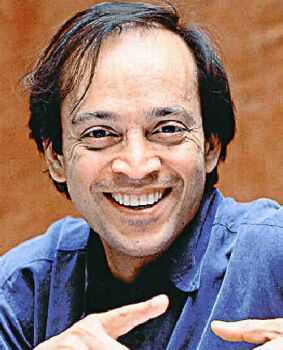
Vikram Seth (born June 20, 1952 in Calcutta [now Kolkata], India) is an Indian poet, novelist, and travel writer best known for his verse novel The Golden Gate (1986) and epic novel A Suitable Boy (1993). Seth was raised in London and India as the son of a judge and a businessman.
- Books Name
- (English) Hornbill & Snapshot Class-11
- Publication
- PathSet Publications
- Course
- CBSE Class 11
- Subject
- English
The Tale of Melon City
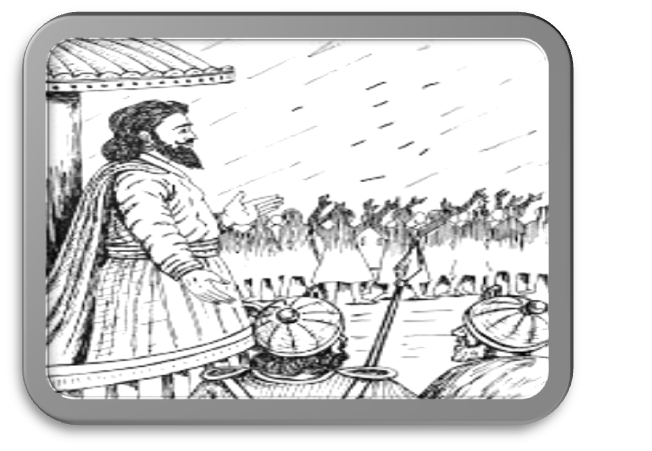
(Vikram Seth)
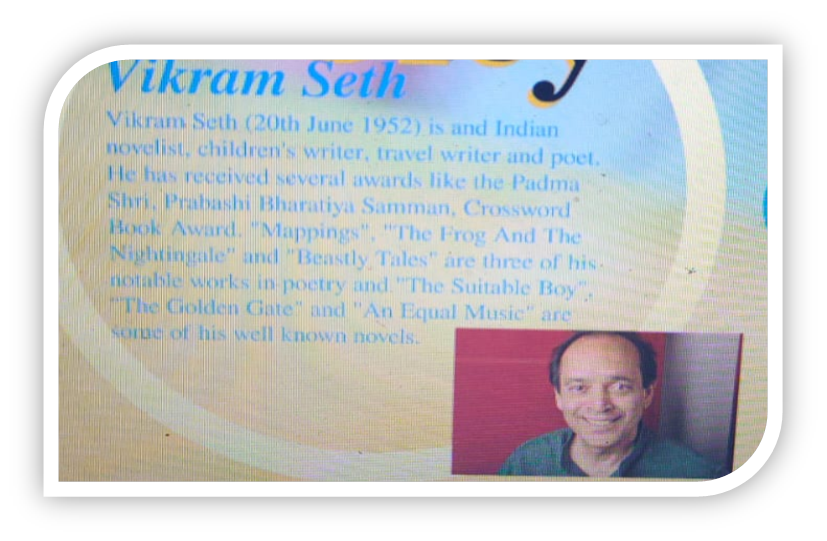
Introduction
It is a humorous poem which shows how stupid the king, the ministers and the people of a certain kingdom were, it was , in fact a kingdom of tools, the king got an arch constructed across the major roads of his kingdom, when he went riding through it has crown was knocked down, the king at once ordered the chief of the builders to be hanged, but the chief put blame on the workmen , the king ordered the workmen to be hanged, but the workmen put the blame on the masons, and the masons put the blame on the architect, but the architect, said that the king himself had made some changes in the original plan of the, arch, now the king got confused , he called the wisest man of the kingdom and asked for his suggestion, that old man said that it was the arch that had banged off, the crown thus the real culprit was the arch and it ought to be hanged but then a councillor said that it would be a shame to hang the arch that had touched the king’s head the king saw that the people, had become restless, they had all gathered there to see that , hanging , so the king said that someone had to be hanged, the noose, was set up but it was somewhat , high, each man was measured by and by, but only the king was tall enough to fit the noose, therefore, it was the king that was hanged, at last, the ministers now declared that anyone who passed the city gate next, would choose the ruler of the asked, state It, happened to be an idiot, when he was asked who was to be people did not bother much about who or what their king was, they only wanted that they should be left to do whatever they desired.
Summary
The poem begins with a description of the King who ordered an arch to be built. When he rode down that arch, it hit his head and his crown fell down. It was because it was built too low. The King thought it was dishonorable and thus commanded the chief of builders to be hanged. The chief of builders put the blame on the workmen who in turn, blamed the bricks. The King orders the execution of the mason who put the blame on the architect. The architect is brought to the Royal Court and indirectly blames the King for the wrongly constructed arch. The placid King now grows angry and demands the wisest man in the country to be brought to the Royal Court. They brought the wisest man, who was so old that he could neither see nor walk. According to him, the arch must be hanged. When the arch is supposed to be executed, one of the ministers argues that it would be a shame to punish something that had touched their mighty King’s head. Everyone, along with the King, agreed. The crowd grew restless and the King promised them a hanging. Therefore, a noose was set up and the one to fit it would be hanged. All were measured one by one but the only one to fit was the King. The ministers heaved a sigh of relief upon finding someone to execute. Thus, as a result of the customer's choice, the next to pass the City gate would choose the new King and the next to pass it was an idiot who wanted a melon to be their King. The melon was given the throne with due ceremony and the town lived happily ever after without any interruption or interference.
Explanation
The following poem is taken from Mappings which was published in 1981 and is included in the Collected Poems by Vikram Seth.
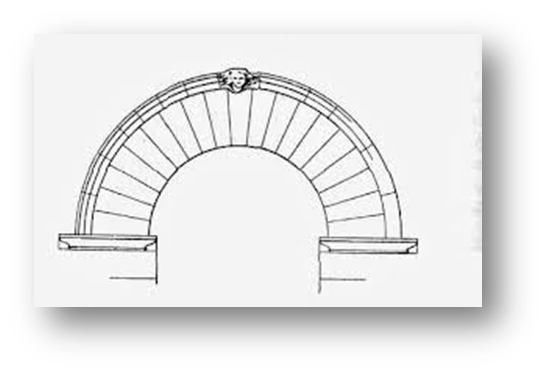
In the city in which I sing
There was a just and placid King.
The King proclaimed an arch should be
Constructed, that triumphally
Would span the major thoroughfare
To edify spectators there.
Word meaning -
Just- based on or behaving according to what is morally right and fair
Placid- calm
Proclaimed- announce officially or publicly.
Arch- a curved symmetrical structure spanning an opening and typically supporting the weight of a bridge, roof, or wall above it.
Triumphally- Celebrating or commemorating a victory
Span- Celebrating or commemorating a victory
Thoroughfare- the main road in a town
Edify- instruct or improve (someone) morally or intellectually
Spectators- onlookers
The city which the poet is talking about was ruled by a ‘just and placid’ King. He is known to be fair and calm in his proceedings. One day, he ordered for an arch to be built on the main road of the town. He felt that it would be a good sight to look at that would motivate the onlookers.
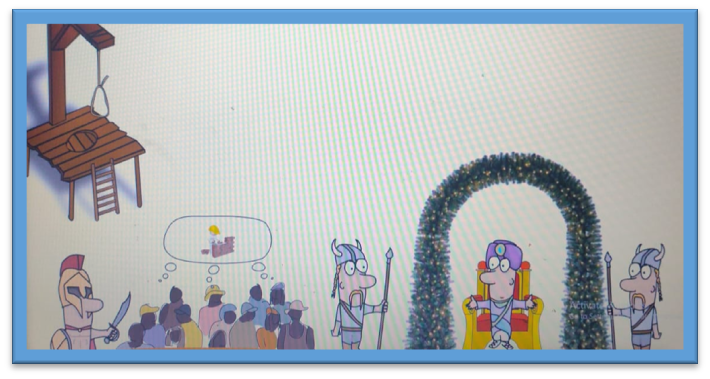
The workmen went and built the thing.
They did so since he was the King.
The King rode down the thoroughfare
To edify spectators there.
Under the arch, he lost his crown.
The arch was built too low. A frown
Appeared upon his placid face.
The King said, ‘This is a disgrace.
The chief of builders will be hanged.’
The rope and gallows were arranged.
Word meaning -
Frown- a facial expression indicating disapproval, displeasure, or concentration, characterized by a furrowing of one’s brows.
Gallows- a structure, typically of two uprights and a crosspiece, for the hanging of criminals
Since it was the King who ordered it to be built, the workmen followed his orders and constructed the arch. To mark its inauguration and indulge the onlookers, the King went to the thoroughfare. There, the arch hit his head and his crown fell down. It happened because the arch was formed too low. His calm expressions were instantly changed, indicating extreme displeasure. He considered it a moment of dishonor and ordered for the chief of builders to be executed by hanging. To fulfill King’s orders, ropes and gallows were put in order.
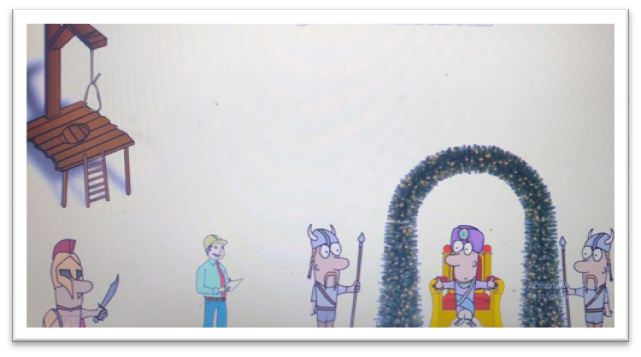
The chief of builders was led out.
He passed the King. He gave a shout,
‘O King, it was the workmen’s fault’
‘Oh!’ said the King, and called a halt
To the proceedings. Being just
(And placider now) he said, ‘I must
Have all the workmen hanged instead.’
The workmen looked surprised, and said,
‘O King, you do not realize
The bricks were made of the wrong size.’
Word meaning -
Halt- bring or come to an abrupt stop
The chief of builders was found and brought to be executed. He was being taken to the King. On seeing the King, the chief of builders immediately shouted and exclaimed that it was the workmen who were at fault. The King immediately called it off and declared that the workmen must be hanged. This hit the workmen with surprise. They pointed out that it was not their fault but the bricks were not of the right size.
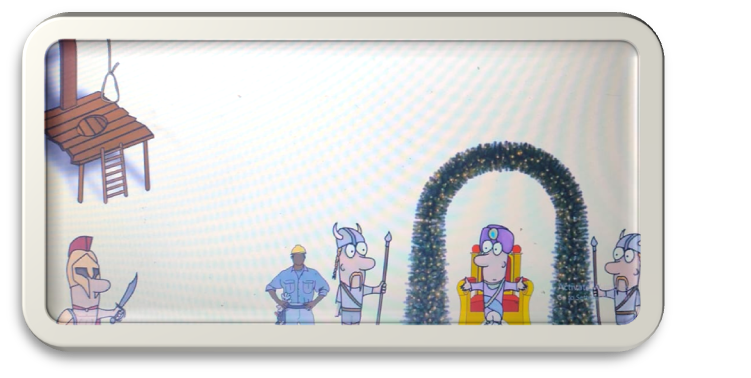
‘Summon the masons!’ said the King.
The masons stood there quivering.
‘It was the architect…’, they said,
The architect was summoned.
Word meaning -
Summon- order someone to be present
Masons- a person skilled in cutting, dressing, and laying a stone in buildings
Quivering- trembling or shaking with a slight rapid motion
Architect- a person who designs buildings and in many cases also supervises their construction
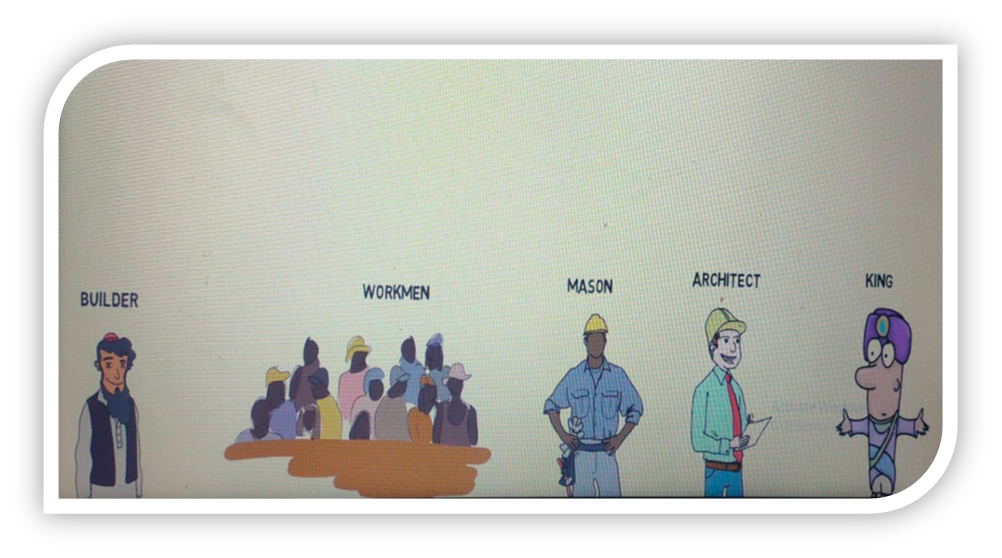
On hearing that it was the bricks that were of the wrong signs, the King called for the masons. The masons were trembling in front of the King. They put the blame on the architect and thus, the architect was called for.
‘Well, architect,’ said His Majesty.
‘I do ordain that you shall be
Hanged.’ Said the architect, ‘O King,
You have forgotten one small thing.
You made certain amendments to
The plans when I showed them to you.’
The King heard this. The King saw red.
In fact, he nearly lost his head;
But being a just and placid King
He said, ‘This is a tricky thing.
I need some counsel. Bring to me
The wisest man in this country.’
Word meaning -
Ordain- order (something) officially
Amendments- a minor change or addition designed to improve something
Saw red- became angry
Counsel- advice, especially that given formally
The King tells the architect that he considers him the one at fault and he must be executed. Instantly, the architect mentions that it was the King who made minute changes to the architect’s initial plan. This indirectly indicated that it was the King who was responsible for the wrongly built arch. The King grew angry but since he was ‘just and placid’, he thought it would be best to consult someone in such a confusing situation. Thus, he ordered them to get the wisest person alive.
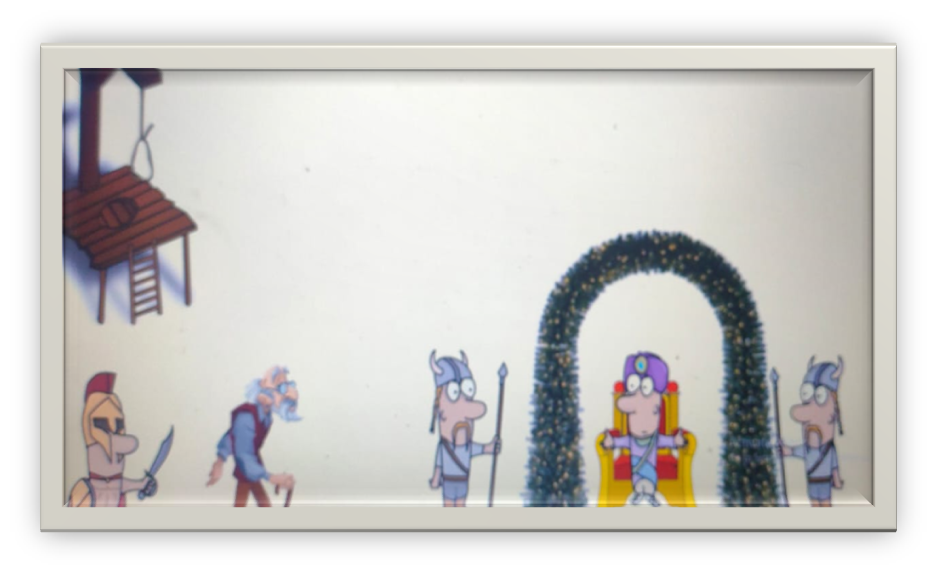
The wisest man was found and brought,
Nay, carried, to the Royal Court.
He could not walk and could not see,
So old (and therefore wise) was he —
But in a quavering voice, he said,
‘The culprit must be punished.
Truly, the arch was that banged
The crown off, and it must be hanged’.
Word meaning -
Quavering- (of a person’s voice) shake or tremble in speaking, typically through nervousness or emotion.
They found the wisest man but he had to be carried to the Royal court for he was so old that he could neither walk nor see properly. With his age, came his wisdom. He finally spoke in his extremely shaky voice that the one at fault must be executed and it is the arch that struck off the King’s crown. Thus, the arch must be hanged.
To the scaffold, the arch was led
When suddenly a Councillor said —
‘How can we hang so shamefully
What touched your head, Your Majesty?’
‘True,’ mused the King. By now the crowd,
Restless, was muttering aloud.
The King perceived their mood and trembled
And said to all who were assembled —
‘Let us postpone consideration
Of finer points like guilt. The nation
Wants a hanging. Hanged must be
Someone, and that immediately.’
Word meaning -
Scaffold- a raised wooden platform used formerly for the public execution of criminals.
Mused- say to oneself in a thoughtful manner
After listening to the wise man’s opinion, the arch was being taken for public execution when suddenly one of the ministers of the Royal Court raised an objection. According to him, it would be disgraceful to hang something that touched the head of their mighty King. The King also found it appropriate. By this time, the crowd became unsettled. They wanted the execution of the one at fault. The King, being ‘just and placid’, recognized the temper of his people and declared that they must postpone something as crucial as determining the guilty. He further added, that if the nation wants a hanging, the guilty, once decided, would be hanged without further delay.
The noose was set up somewhat high.
Each man was measured by and by.
But only one man was so tall
He fitted. One man. That was all.
He was the King. His Majesty
Was therefore hanged by Royal Decree.
Word meaning -
Noose- a loop with a running knot, tightening as the rope or wire is pulled and used to trap animals or hang people
Decree- an official order that has the force of law
To ascertain the one to be executed, they set up a noose and the one to fit in it would be hanged. Each man was called and measured one by one. The noose was set up at quite a high point and the only man tall enough to fit in the noose was the one and only; the King. Finally, they had found someone to be executed and their King was hanged by the official force of law.
‘Thank Goodness we found someone,’ said
The Ministers, ‘for if instead
We had not, the unruly town
Might well have turned against the Crown.’
‘Long live the King!’ the Ministers said.
‘Long live the King! The King is dead.’
Word meaning -
Unruly- disorderly and disruptive and not amenable to discipline or control
Against the Crown- questioning the power, integrity and honesty of the state
The Ministers of the Royal Court heaved a sigh of relief as they found someone to be put to death for the faulty arch. They feared that if they would have not found someone, the disorderly crowd would begin questioning the power and integrity of the power vested in the Crown. “Long live the King”, everyone said. It brings out the irony because the King they were hailing for, was no longer alive. They wanted their King to live a long life but on the other hand, they were relieved to have found someone to execute even if it was their King.
They pondered the dilemma; then,
Being practical-minded men,
Sent out the heralds to proclaim
(In His [former] Majesty’s name):
‘The next to pass the City Gate
Will choose the ruler of our state,
As is our custom. This will
be Enforced with due ceremony.’
Word meaning -
Pondered- think about (something) carefully, especially before making a decision or reaching a conclusion
Heralds- an official employed to oversee state ceremonial, precedence, and the use of armorial bearings, and (historically) to make proclamations, carry official messages, and oversee tournaments
Proclaim- announce officially or publicly
At first, the ministers were indecisive as to how to choose their new King. But reasonable as they were, they sent out the official messengers to declare that their next ruler will be chosen by the one who passes the City Gate next. The one chosen by him will be declared ‘King’ with the due ceremony as was the custom.

A man passed by the City Gate.
An idiot. The guards cried, ‘Wait!
Who is to be the King? Decide!’
‘A melon,’ the idiot replied.
This was his standard answer to
All questions. (He liked melons.) ‘You
Are now our King,’ the Ministers said,
Crowning a melon. Then they led
(Carried) the Melon to the throne
And reverently set it down.
Word meaning -
Reverently- with deep and solemn respect
The next to pass the City Gate was a man, nay, an idiot. The guards stopped him and asked him to name their next King. An idiot as he was, he answered ‘a melon’. Not to call it his mistake or anyone else’s, this was his fixed reply to all the questions as the man was fond of melons. The ministers crowned a melon believing that it is now going to rule over their city. They set the melon on the throne and declared him ‘King’.
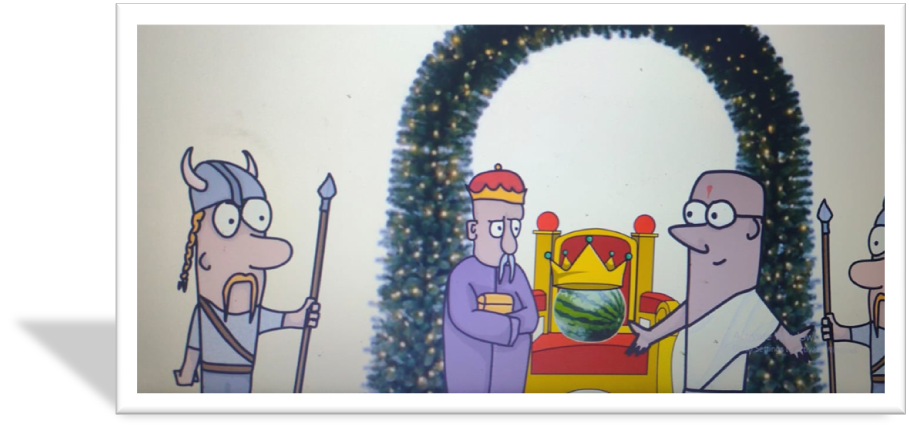
This happened years and years ago.
When now you ask the people, ‘So —
Your King appears to be a melon.
How did this happen?’, they say, ‘Well, on
Account of customary choice.
If His Majesty rejoice
In being a melon, that’s OK
With us, for who are we to say
What he should be as long as he
Leaves us in Peace and Liberty?’
The principles of laissez faire
Seem to be well-established there.
Word meaning -
Customary- according to the customs or usual practices associated with a particular society, place, or set of circumstances
Rejoice- feel or show great joy or delight
Laissez-faire- the policy of leaving things to take their own course, without interfering
Now, the melon was declared the King many years ago and now when anyone asks the people of the city about how it all happened, they simply call it a “customary choice”. It means that their regulations pushed them towards making a melon their King. But now, they are more than happy with their King being a melon because the people live in peace and enjoy freedom. They are flourishing with no interference from their King.

 ACERISE INDIA
ACERISE INDIA
 PathSet Publications
PathSet Publications
